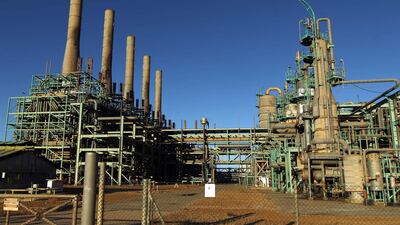Upcoming elections in oil producing states Libya and Nigeria may add a new twist to a familiar theme for Opec.
The oil exporting group’s strategy has repeatedly been adapted to suit the unpredictable political environment in these two African producers, which in their prime were among the continent’s most important basins. Both were excluded from the 1.8 million barrels per day production cut deal agreed by Opec and Russia back in late 2016 to rebalance the market.
However, unrest has diminished their abilities as major global producers and their influence within Opec. Elections may not change their outlook but they could provide some much needed stability.
Libya’s elections are first up on December 10. However, should the battle over infrastructure between rival groups in the country resume then there is no guarantee they will go ahead. The relationship between the UN-backed National Oil Corporation (NOC) in Tripoli, the Libyan National Army, which is the de facto eastern authority, and the UN-backed Government of National Accord is a fragile one.
The country’s oil sector, especially its key oilfields and facilities, are likely to be used as leverage between different militias and factions ahead of December’s elections.
Libya's critical oil infrastructure is protected by a complex patchwork of security agreements between NOC and local militias. This leaves production extremely vulnerable to sudden disruptions due to blockades.
Production is back up above 1 million bpd thanks to a recovery in the pivotal 340,000 bpd of capacity from the Sharara oilfield. The area – deep in the country’s remote western interior hinterland – was shut down abruptly in mid-June after gunmen entered a substation and kidnapped four staff members. Wells in the surrounding area were shutdown as a precaution and workers evacuated.
Libya's oil output fell to 670,000 bpd in July, its lowest since April 2017, according to the latest S&P Global Platts survey. Authorities were forced to deal with a militia blockade of its eastern ports, which was resolved on July 11, as well as the Sharara kidnappings. However, the prospect of Libya achieving its near-term capacity target of around 1.2 million bpd remains unlikely.
“The last Libyan elections in 2014 resulted in the formation of two rival governments, and we are not optimistic for a better outcome this time around,” said Paul Sheldon, Associate Director, Political Risk at S&P Global Platts Analytics. “Without a clear path to resolving the conflict, renewed clashes for oil assets would be unsurprising.”
Then there is Nigeria, where elections are scheduled on February 16. Unlike Libya, the sub-Saharan producer has made great strides in tackling militants who have repeatedly targeted its oil industry. Crude production has recovered in the past 12 months after output plummeted to near 30-year lows of 1.1 million bpd in mid-2016 due to renewed attacks in the Niger Delta.
Crude oil and condensate production has ranged between 1.7 million bpd and 2 million bpd this year. Although this is still far below its capacity of 2.2 million bpd as pipeline sabotage in the Niger Delta has persisted it marks a turnaround in Nigeria’s outlook. S&P Global Platts estimated its output at 1.8 million bpd in July.
In the past two years, President Muhammadu Buhari and his government have found ways to keep the militants quiet through promises of development, a lot of money and a shaky amnesty programme. But his administration faces a stiffer challenge as it heads into a volatile presidential campaign season.
The danger is that supply disruptions in the Niger Delta might escalate in the months leading up to the elections and trouble Mr Buhari’s chances of winning a second term.
Nigeria is hanging its hopes on the 200,000 bpd offshore Egina project to boost its production by over 10 per cent, as the field is expected to come online later this year. No new big oilfields have started up in the West African country in nearly five years, which is why this project is crucial for the continent’s largest oil producer.
The country’s oil ministry has acknowledged it needs to start prioritising the approval of new projects with international oil companies and a review of the fiscal terms in agreements with foreign partners to develop deepwater oilfields. However, it’s unclear how a change in government would affect the process.
Both Nigeria and Libya have the potential to add extra barrels to the market but their ability to deliver is complicated by their respective electoral processes. Instead of adding barrels both countries are more likely to suffer continued disruptions.
Libyan and Nigerian crude tends to be higher quality, which is increasingly oversupplied. It will increasingly have to compete with growing volumes of sweet light shale oil from the US, which continues to flood the market. US output is likely to reach almost 11 million bpd in 2018 and head towards 12 million bpd by the following year.
Libya and Nigeria could add to a market awash with low sulphur crude if elections deliver the stability both nation’s crave.
Paul Hickin is associate director for oil at S&P Global Platts. Eklavya Gupte is senior editor, Oil News

